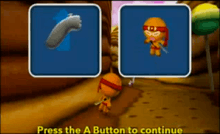Ninjabread Man
| Ninjabread Man | |
|---|---|
|
North American boxart, Wii version | |
| Developer(s) | Data Design Interactive |
| Publisher(s) |
Metro3D Europe (PlayStation 2 and PC) Data Design Interactive (Europe, Wii) Conspiracy Entertainment (North America) |
| Engine | GODS engine, Havok, RenderWare |
| Platform(s) | Wii, PlayStation 2, Microsoft Windows |
| Release |
PlayStation 2
Microsoft Windows
Wii
|
| Genre(s) | Platformer |
| Mode(s) | Single player |
Ninjabread Man is a platform video game by developer and publisher Data Design Interactive. The game was released on the PlayStation 2 and Microsoft Windows in Europe in July 2005. A port for the Wii was released on 21 September 2007 in Europe, 27 September in Australia, and 3 October in North America. Ninjabread Man was published as part of Data Design Interactive's 'Popcorn Arcade' brand of Wii games.
The development of Ninjabread Man began as a re-imagining of the Commodore Amiga classic Zool: Ninja of the Nth Dimension which was largely favourably received on its initial release in 1992. Zoo Digital Publishing commissioned DDI to re-imagine Zool as a 3D game for eventual release on the PlayStation 2 and the GameCube, however the publisher was unimpressed with the results and canned the project. DDI opted to continue with the game, but changing the theme and character for Ninjabread Man.
Ninjabread Man has received unanimously negative reviews from critics and has been regarded as one of the worst games of all time, being heavily criticized for its controls, camera system, graphics, story and short length.
Gameplay

Ninjabread Man is an action-adventure platformer. There are three levels in the game, plus a tutorial level.[1] In order to proceed to the next level, players must collect eight power rods to activate a teleporter.[2] When the player completes a level and plays it again, a menu appears with a second mode available, ‘Score Pickups’. If the level is completed again in this mode, the player will unlock ‘Time Attack’ mode. Completion of this mode unlocks the ‘Hidden Pickups!’ alternative mode.[2] Several comic attacks appear in the game, such as the Samurai Sword attack that reduces enemies to jam.
Reception
Ninjabread Man received unanimously negative reviews upon release. The PlayStation 2 version of the game has a 31% average rating on GameRankings,[3] while the Wii version has an average of 17.5%.[4] On Metacritic, the Wii version of the game has an average score of 20/100, based on 6 reviews.[5] The PC version of the game was not reviewed by any major publication.[6] Despite the negative reception of the first game, on 23 January 2008, a sequel titled Ninjabread Man II: Blades of Fury was announced.[7]
IGN gave the Wii version a score of 1.5/10, saying: "Is Ninjabread Man actually a good game? No chance. It’s buggy, often completely broken, somehow manages to have frame issues in tiny levels, and is completely ruthless if (and when) younger players die."[8] Thunderbolt gave it 1/10, citing the game's length and the unimaginative use of the character as key flaws, "Ninjabread Man could be a cool guy with a bad attitude, in a stark and ironic contrast to his surroundings. He could be the Jack Bauer of the bakery, but instead our hero is silent and lifeless."[1]
ScrewAttack made it a SAGY nominee for "Worst Multiplatform Game of 2007", blaming the quality assurance testers for not pointing out the flaws.[9]
Sequel
Despite the negative reception of the first game, on 23 January 2008, a sequel titled Ninjabread Man II: Blades of Fury was announced.[10] Not much information nor a release date had been issued. But it had been revealed that Data Design had created a website asking for the fans of the game to give ideas for the sequel. It is likely the sequel will never be developed due to Data Design ceasing development in 2009.
See also
- Anubis II, another Data Design Interactive game part of the MythMakers Range of titles.
- Myth Makers: Trixie in Toyland, another Data Design Interactive game part of the MythMakers Range of titles.
- Rock 'n' Roll Adventures, another Data Design Interactive game part of the MythMakers Range of titles.
References
- 1 2 Morton, Philip (6 January 2008). "Ninjabread Man Wii review". Thunderbolt. Retrieved 15 July 2010.
- 1 2 "IGN: Ninjabread Man". IGN. Retrieved 15 July 2010.
- ↑ Ninjabread Man Reviews
- ↑ Ninjabread Man Reviews
- ↑ Ninjabread Man (wii: 2007): Reviews
- ↑ Ninjabread Man
- ↑ Data Design Interactive » Highlights » Ninjabread Man – Blades of Fury
- ↑ Bozon, Mark (8 January 2008). "Ninjabread Man Review". IGN. Retrieved 15 July 2010.
- ↑ "SAGY Awards- Worst Multiplatform Game of the Year Nominees". ScrewAttack. YouTube. 5 March 2014. Retrieved 5 March 2014.
- ↑ Data Design Interactive » Highlights » Ninjabread Man – Blades of Fury
